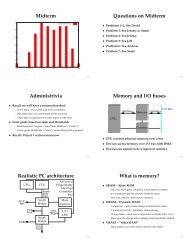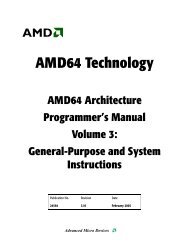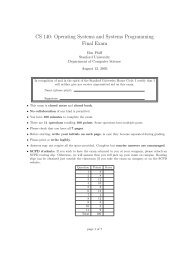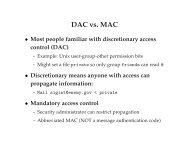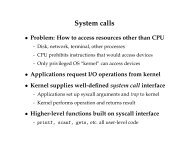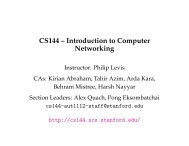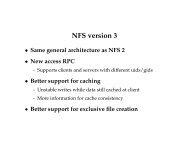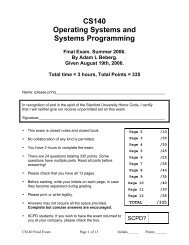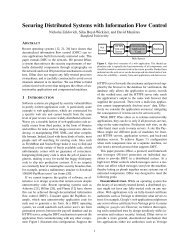Using TCP Through Sockets
Using TCP Through Sockets
Using TCP Through Sockets
You also want an ePaper? Increase the reach of your titles
YUMPU automatically turns print PDFs into web optimized ePapers that Google loves.
• suio *tosuio () const;<br />
Returns a pointer to the suio in which the strbuf is storing accumulated data.<br />
6.4 Reference counting<br />
Strings are not the only data structure for which deallocation becomes tricky in asynchronous<br />
programming. libasync therefore provides a generic mechanism for reference-counted deallocation<br />
of arbitrary dynamically allocated data structures. Refcounting is a simple form of<br />
automatic garbage collection: each time a refcounted object is referenced or goes out of scope<br />
its reference count is incremented or decremented, respectively. If the reference count of an<br />
object ever reaches zero, the object’s destructor is called and it is deleted. Note that unlike<br />
real garbage collection in languages like Java, you cannot use reference-counted deallocation<br />
on data structures with pointer cycles.<br />
Reference counted objects are created by allocating an instance of the refcounted template:<br />
class foo : public bar { ... };<br />
...<br />
ref f = New refcounted ( ... );<br />
ptr b = f;<br />
f = New refcounted ( ... );<br />
b = NULL;<br />
Given a class named foo, a refcounted takes the same constructor arguments<br />
as foo, except that constructors with more than 7 arguments cannot be called due to the<br />
absence of a varargs template. A ptr p behaves like a foo *p, except that it is<br />
reference counted: *p and p->field are valid operations on p whichever its type. However,<br />
array subscripts will not work on a ptr. You can only allocate one reference counted<br />
object at a time.<br />
A ref is like a ptr, except that a ref can never be NULL. If you try<br />
to assign a NULL ptr to a ref you will get an immediate core dump. The<br />
statement ref = NULL will generate a compile time error.<br />
A const ref cannot change what it is pointing to, but the foo pointed to can<br />
be modified. A ref points to a foo you cannot change. A ref can<br />
be converted to a ref. In general, you can implicitly convert a ref to a<br />
ref if you can implicitly convert an A to a B. You can also implicitly convert a ref<br />
or ptr to a foo *. Many functions can get away with taking a foo * instead of a<br />
ptr if they don’t eliminate any existing references.<br />
On both the Pentium and Pentium Pro, a function taking a ref argument usually<br />
seems to take 10-15 more cycles the same function with a foo argument. With some versions<br />
of g++, though, this number can go as high as 50 cycles unless you compile with ’-fnoexceptions’.<br />
30



